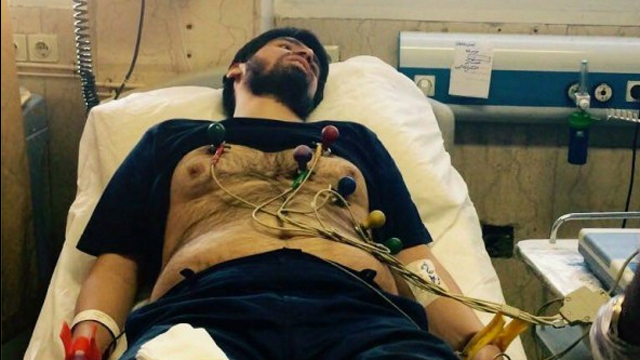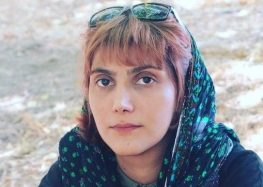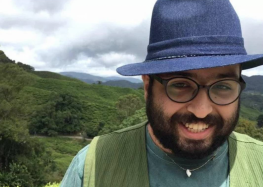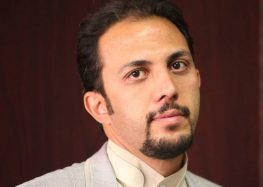Imprisoned Journalist Who Sent Letter to Supreme Leader Saying He Was Tortured is Hospitalized

Ehsan Mazandarani, who went on hunger strike on May 17, is in intensive care following a heart attack
A little over a month after he sent a letter to Iran’s supreme leader stating that he had been tortured, imprisoned reformist newspaper editor Ehsan Mazandarani was rushed from Evin Prison to a hospital in Tehran after suffering a heart attack following his hunger strike.
“Ehsan has been tortured and put under a lot of pressure during interrogations,” Mazandarani’s brother-in-law Sam Hosseini told the International Campaign for Human Rights in Iran. “We want the interrogators to face the law and be investigated for their illegal actions.”
“Ehsan has written to the supreme leader and explained what happened to him during his interrogations and requested that [the supreme leader] conduct an investigation,” added Hosseini. “On May 17, three days after Ehsan sent the letter, he was taken from Ward 8 to Ward 2-A [controlled by] the Islamic Revolutionary Guards Corps (IRGC) and was pressured to deny what he had written in his letter. Ehsan refused to do so and said he had written nothing but the truth.”
“We want Members of Parliament to set up a fact-finding commission to see the video recordings of the interrogations, which are certainly in existence, and look into this matter so it doesn’t happen to other prisoners,” he said.
Obtaining forced “confessions” in politically motivated cases, often extracted under the threat of or actual torture, is a common practice in Iran.
Hosseini said he could not provide details about the type of torture his brother-in-law had experienced.
“Ehsan had a heart attack on Monday morning [June 20, 2016] in Evin Prison’s Ward 8 and was taken to Sina Hospital,” said Hosseini. “They first took him to the [prison] infirmary but it lacked the necessary equipment, so they transferred him to the hospital and now he’s in the intensive care unit. Fortunately, the [greatest] danger has passed and he’s under medical supervision.”
“Political and Personal Retaliation”
Hosseini told the Campaign he is baffled by the authorities’ continued refusal to look into Mazandarani’s demands.
“His case goes back to [former President Mahmoud] Ahmadinejad’s era, when he was arrested along with 20 other journalists in 2012,” he said. “They were released after 18 days and the Intelligence Ministry requested the cessation of their prosecution and the cases were dropped against all of them.”
“Now, during [the government of President Hassan] Rouhani, the IRGC has reopened the case and punished Ehsan,” added Hosseini. “This is questionable behavior… We think it’s political and personal retaliation.”
In another letter written by Mazandarani on June 18, 2016, a copy of which was obtained by the Campaign, the reformist journalist said his health had seriously declined since his imprisonment.
“I can barely hear my breathing these days. When I want to get out of bed, my cellmates have to rush to help me. I’m experiencing serious difficulties with my speech and hearing,” wrote Mazandarani, adding that he has been suffering excruciating pain from infections in his digestive tract.
Mazandarani was also hospitalized last month, on May 31, 2016, due to complications resulting from the hunger strike that he had started on May 17 to protest prison conditions and the authorities’ refusal to free him on bail until the Appeals Court meets to rule on his seven-year prison sentence.
In his June 18 letter, Mazandarani said his case was originally based on the charge of “propaganda against the state,” but that another charge, “assembly and collusion against national security,” was added on illegally and he was unjustly sentenced to seven years in prison.
Mazandarani also said he believes he is being punished in part for sharing a video in 2015 that showed former President Akbar Hashemi Rafsanjani saying goodbye to his son Mehdi Hashemi before his son began his prison sentence on corruption charges.
Rafsanjani, one of the founding members of the Islamic Republic, began to fall out of favor with Iran’s ruling clerics and the IRGC after the country’s widely disputed 2009 elections, when he publicly objected to the brutal crackdown and imprisonment of protesters. The imprisonment of his son was viewed as retaliation by hardliners for Rafsanjani’s alleged taking of sides against the supreme leader and the military apparatus during the widespread protests.
While the Judiciary and intelligence organizations worked together to prosecute Mehdi Hashemi and sentence him to 10 years in prison—with conservative media cheering on the process—the image of a farewell moment between a father and his son angered those who had been engaged in a non-stop media campaign against Mehdi Hashemi.
Mazandarani was arrested on November 2, 2015 by IRGC agents, along with two other journalists during an escalating crackdown by the Revolutionary Guards.






